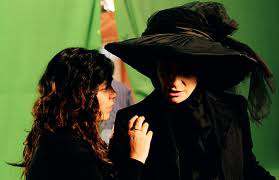Women’s History Spotlight: Jeannette Rankin

Director Kamala Lopez’s film tells the story of the first woman elected to the House of Representatives, one who bridged the suffrage, civil liberties, anti-war and women’s movements of 20th century America.
Throughout her life, feminist and pacifist Jeannette Rankin made history. In 1916, the people of Montana elected her to represent them in Congress, the first woman in the legislature. Rankin co-founded the American Civil Liberties Union, voted against U.S. entry into World War I and was the only Congress member to vote against the entering World War II. Rankin remained active until her death in 1973 at 92, leading a group of women in a protest against the Vietnam War and staying connected to the women’s movement.
When actress, activist and director Kamala Lopez saw a one-woman show about Rankin in 2005—“A Single Woman” by peace activist and theater artist Jeanmarie Simpson—she couldn’t believe she’d never heard of Rankin. The story so moved Lopez that she determined to get it to a broader audience.
“She’s an amazing, incredible role model,” Lopez said. “Women couldn’t vote and she got herself elected to change that. That is such out of the box thinking. If more girls knew about this instead of always hearing about Paris Hilton, we’d be getting somewhere.”
Lopez said one of the things that impressed her about Rankin was her bravery in standing up for what she believed. She held on to her anti-war stance when it became extremely unpopular.
“Every other person in Congress voted to go to war after Pearl Harbor—it was just reactive,” Lopez said. “She had to hide in a phone booth in the Capitol until guards took her out. Then there was a smear campaign against her as being anti-Semitic after she had been lobbying to let Jewish refugees into the country. She was so brave. She didn’t give a rat’s ass what anybody thought of her. She knew in her bones what she thought was right. It’s a lonely road and people don’t appreciate it, especially when you’re female. You’re a battle ax or a difficult broad, and we get intimidated by that.”
Lopez said another thing she admired about Rankin was that she didn’t take no for an answer.
“I really related to that,” Lopez said. “That’s been my pattern my whole life. I just don’t do it. I was a Hispanic actress when nobody was doing that. I had to play whores and maids and gang members, but I did it. The theater department at Yale kicked me out every semester because the chair hated me, but I kept going back. I just went around him. This one guy isn’t going to stop me. And that’s how Jeanette was. She was like, ‘How are we going to skin the cat because the cat is going to get skinned.’”
Lopez used her determination and drive to make a 90-minute movie about Rankin, also called “A Single Woman,” on an extremely limited budget. Lopez didn’t have the $90,000 a week it cost to rent a soundstage in Los Angeles, so she convinced Mikel Elliott, the owner of Quixote Studios, to let her use it for free. That gave her only four days to shoot the movie, which starts near the end of Rankin’s life and goes backwards.
“He said, ‘If you want to do it over Thanksgiving weekend, I’ll only charge you for the person who has to stay there and turn on stuff and the air conditioning,’” Lopez said. “That meant we had to do 85 scenes in four days. The hardest thing was aging the actress. I storyboarded out every frame and we tried to do them in one shot or if absolutely necessary, two.”
Lopez got famous friends involved such as Martin Sheen, who narrates; Judd Nelson, who plays a Jewish journalist asking Rankin, played by Simpson, about her stance against World War II; and Patricia Arquette, who narrates a story about Native Americans and pioneers that was very important to Rankin. Lopez also convinced singer Joni Mitchell to let Lopez use her songs “The Circle Game” and “Woodstock” in the movie.
Lopez started her production company, Heroica Films, to make movies about and for women, and she does a lot of work with girls in gangs and inner city schools. Jeannette Rankin’s spirit and story speaks to these girls, Lopez said.
“These are young women from the ghetto, and you think they will be bored or make fun of it, but they love it,” Lopez said. “It blows them away. That’s always been my mission with these girls—to show them they can do it and give them a path to do it.”
More articles by Category: Arts and culture, Politics
More articles by Tag: Film, Women's leadership




























